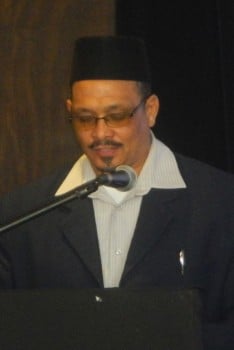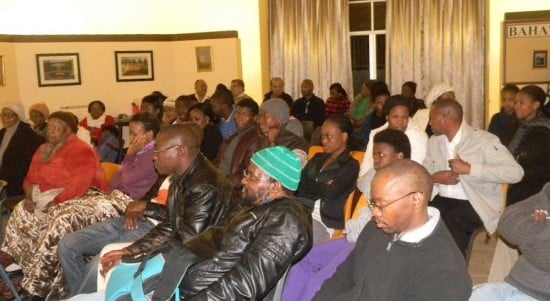The South African Baha’i community sponsored a number of events around the country for its part in the Five Years Too Many campaign, enlisting the support of a range of officials, religious leaders, and media outlets.
On 27 April, to coincide with national Freedom Day in South Africa, local Baha’i communities in Durban and Mafikeng screened the film “Iranian Taboo,” a documentary film by prize winning Iranian-Dutch director Reza Allamehzadeh about the persecution of Iranian Baha’is.
In Durban, the screening was held at the Howard College Theatre at the University of Kwa-Zulu Natal, and was well attended by academics, students, and members of the local Baha’i community.
In conjunction with that screening, a number of professors at the University signed a joint statement calling for the release of the seven imprisoned Iranian Baha’i leaders. The statement asks the South African government to call on Iran to “uphold its obligations” to the International Covenant on Civil and Political Rights and to “immediately release these prisoners of conscience and allow the members of the Baha’i Faith in Iran to enjoy full citizen rights.”
The statement was signed by Prof. Kartha Govender, a law professor and human rights specialist at the University; Prof. Johannes Smit, Dean of the School of Religion and Theology; and Prof. Patrick Bond, director of the Center for Civil Society, among others.
In Mafikeng, the screening was hosted at the Mafikeng Baha’i center and drew about 60 people.
In both places, local news media also covered the campaign. In Durban, East Coast radio interviewed Vida Vafae about the story of her husband’s father’s execution in Iran in the early 1980s. In Mafikeng, Motsweding FM and a local newspaper, the Mafikeng Mail, reported on the issues of the campaign.
On 15 May, the South African Baha’i Diplomatic Office sponsored a breakfast meeting in Johannesburg to discuss human rights in general, and as they relate to the situation of Iranian Baha’is in particular.

Shaykh Achmat Sedick, executive member of the South African Muslim Judicial Council, speaking in Johannesburg.
The featured speaker was Shaykh Achmat Sedick, executive member of the Muslim Judicial Council, who talked about freedom of religion or belief from an Islamic perspective.
He said “the basis of the belief of Islam is justice and fairness.” In that context, he added, “You can’t believe unless you are free” and “belief is the right of everyone.”
The Qur’an makes that explicitly clear when it says “There is no compulsion in religion,” said Shaykh Sedick.
He also discussed one of the sayings of Mohammed, that “he who changes his religion, kill him,” which has widely been used to justify punishment for apostasy in Islam. Shaykh Sedick said he subscribes to the scholarly viewpoint that this saying – commonly known as a Hadith – should be considered unverified, since it has been transmitted by only one person.
He added that he believes the persecution of Baha’is in Iran is political. “It’s got nothing to do with the religious,” he said.
At the same event, Julia Mabale, deputy chairman of the Commission for the Promotion of Cultural, Religious and Linguistics Rights, promised to put the issue of the persecution of Iranian Baha’is before the Commission and to advocate for action to protect and promote “the religious rights of the Baha’is in Iran.”
Other media outlets covering the campaign in South Africa included two radio stations: SAfm, a national station owned by the South African Broadcasting Corporation, and Voice of the Cape, a Muslim-oriented station based in Cape Town.
